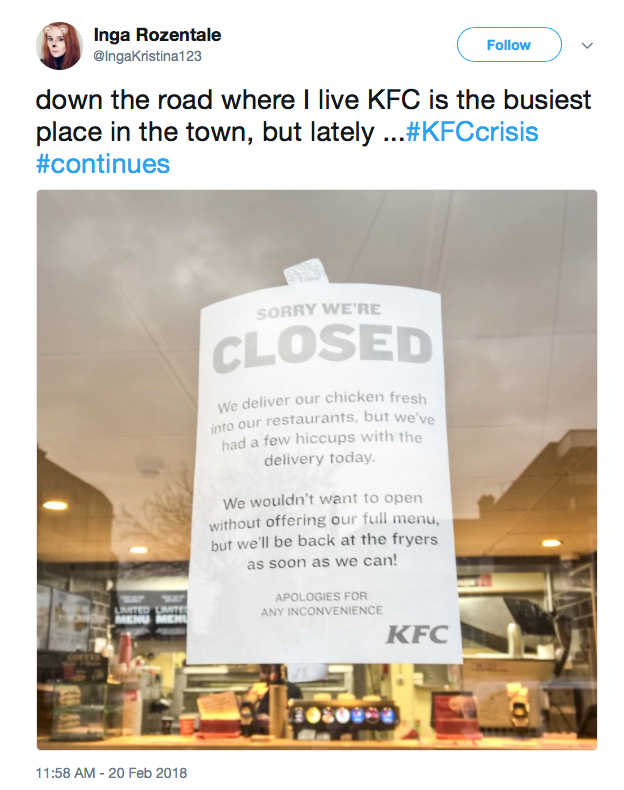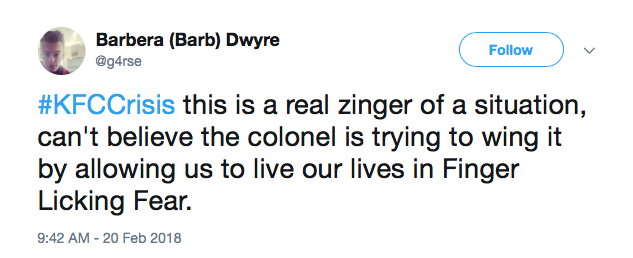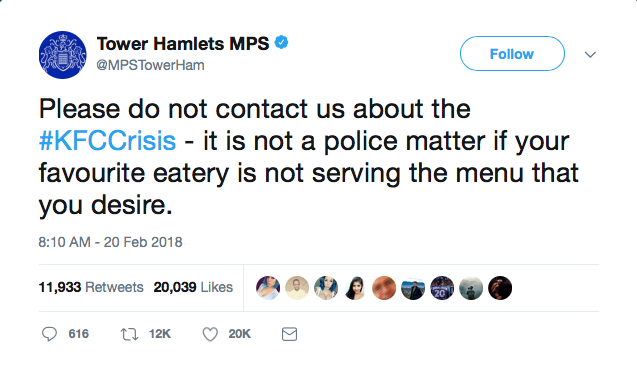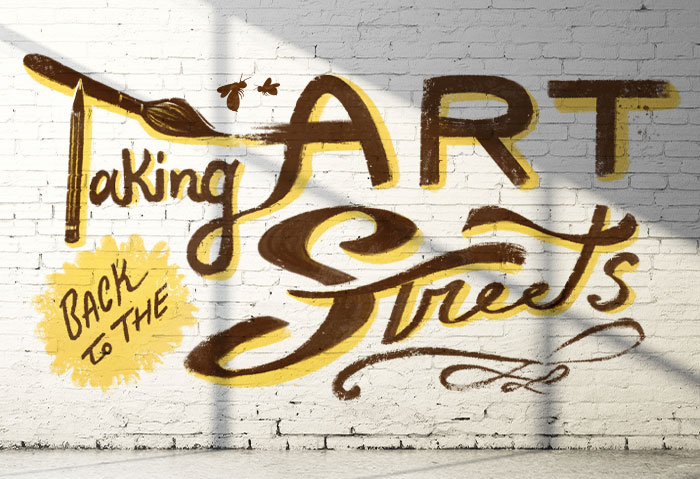How KFC Mastered The “I’m Sorry” Ad
Mistakes: they happen to the best of us. They even happen to companies, and that’s where the corporate apology letter comes in. A rather painful statement for the corporation, these public apologies are becoming more and more prevalent—and necessary. What was once a corporate custom of stating “oops” is now a much more high-stakes practice thanks to social media, where “sorry” can turn to scandal in a matter of tweets.
In fact, it’s become commonplace for Twitter users to edit and “fix” corporate apologies in an attempt to discredit the sentiment behind them. The more consumers demand an apology, the more careful a brand has to be with its wording—and the more likely they are to step on someone’s toes again, leaving them with something else to apologize for.
What’s a brand to do?
So, the world is watching, and you messed up. What’s a brand to do? Ask KFC.
Nearing the end of February, KFC locations in the UK encountered the ultimate nightmare for a chicken-centric restaurant chain: no chicken. Thanks to a change in suppliers, somewhere along the line, KFC fell short of delivering chicken to more than 800 of its 900 UK locations, forcing them to temporarily close.

Needless to say, it didn’t go over well with consumers.


No sooner than the doors were shut did the internet break out in cries of “We need chicken!” and “Only ’90s kids will remember when KFC had chicken.” British police even had to issue a statement to stop people from calling them to complain about the shortage. Things were not looking good.

Then, on February 23rd, KFC issued this full-page apology ad in newspapers across the UK.

It went viral. The brand not only undid the damage of its PR disaster, but it garnered widespread praise instantly with just one single ad. It’s the stuff that corporate dreams are made of, and definitely worth looking into how and why this masterful apology won hearts so easily.



5 Reasons KFC’s Apology Was Done Right
1. It’s got personality
It’s easy to be mad at a brand. It’s a bit harder to be mad at a brand that sounds like a real person. Part of what makes an apology acceptable is the feeling that the sentiment is heartfelt. With our predisposed distrust for companies, it’s even harder for a corporation to accomplish sincerity than it is for a person. By writing the apology in the voice of a genuine human, and not a stiff CEO, KFC made it that much easier for consumers to accept it and let the brand out of the doghouse.
2. It’s eye-catching
Even the most well-worded apology isn’t worth a dime if no one reads it, and in a time where corporations are saying sorry seemingly every day, it’s even harder to get anyone to care about yours. However, with its eye-catching bright red background against a sea of black and white newspaper print, readers are immediately drawn in, and the tongue-in-cheek punning keeps them there. It works a lot better than the traditional all-copy apologies most companies put out.
3. It’s funny
We can cry about our mistakes, or we can laugh at them. KFC chose the latter, and it definitely worked in their favor. The brand was already known for its sense of humor, so why not use it? The lighthearted tone that came with the humor of this ad helped diffuse the situation much better than a rigid, serious apology ever could.
4. It’s honest
Honesty is the best policy, and when you’re apologizing, it’s kind of the whole point. When KFC initially cited “operational issues” as a result of switching suppliers to be the cause of The Great Chicken Shortage, people were quick to call BS.
When a brand is apologizing, no one wants to hear “it wasn’t our fault” even if, in reality, it truly wasn’t. The best practice is to admit there was a mistake, take full ownership of it and just say sorry (and mean it). KFC even took this a step further and thanked their customers for bearing with them. Now that’s classy.
5. It diverts attention
It’s important to note that prior to this ad running in newspapers across the UK, the public perception of KFC had taken a nosedive and the disingenuous “operational issues” excuse had only made things worse.
However, no sooner than the ad was released did the tide swing in KFC’s favor. Who cares if they don’t have chicken? They made a funny pun using everyone’s favorite swear word!
In my opinion, that’s the key that made this apology such a hit: it spoke true to the brand’s voice, caught eyes, gave a few laughs and took ownership of the mistake, but ultimately, it got people talking about something other than the fact that KFC seriously FCK’d up. Does a perfect apology exist? Probably not. But after completely shifting public perception with just three letters, I think this one is pretty darn close.
What do you think? Does a good apology ad really fix a PR nightmare? Did KFC hit the nail on the head or simply have a moment of clever word play? Let us know in the comments below!
Punny or Not: Your Dad Joke Survival List
The InstaNovel: Your Fave New Way to Read on Instagram
Six Questions for Madeline Austin










